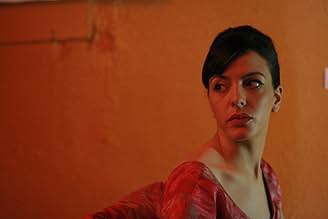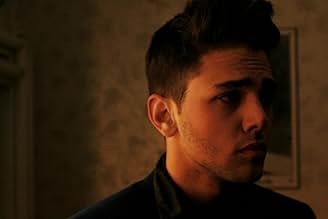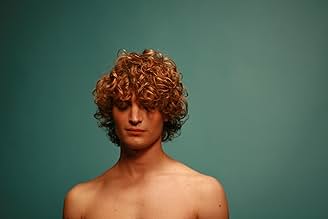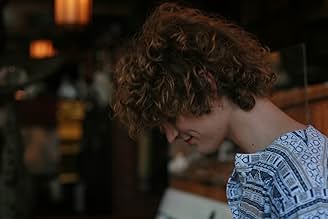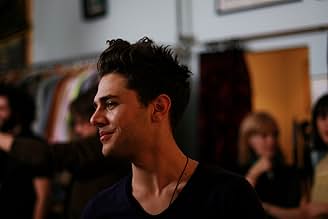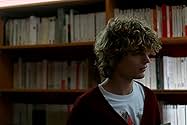IMDb-BEWERTUNG
7,0/10
30.809
IHRE BEWERTUNG
Die Geschichte von drei engen Freunden, die in ein Liebesdreieck verwickelt sind.Die Geschichte von drei engen Freunden, die in ein Liebesdreieck verwickelt sind.Die Geschichte von drei engen Freunden, die in ein Liebesdreieck verwickelt sind.
- Auszeichnungen
- 6 Gewinne & 15 Nominierungen insgesamt
Magalie Lépine Blondeau
- Jeune femme 2
- (as Magalie Lépine-Blondeau)
Benoît McGinnis
- Baise 2
- (as Benoit McGinnis)
François-Xavier Dufour
- Baise 3
- (as François Xavier Dufour)
Empfohlene Bewertungen
I agree with another reviewer that love is not the real subject of the film. The characters think they're feeling love, and they're certainly looking for love, but in such a shallow and conniving way they're incapable of getting beyond mere sensuality at best. This is a film which starts out superficially, as superficial as its characters. Their lack of depth is underlined by the interviews of more interesting people that we would almost rather be following, but we're stuck with this trio of narcissists trying to impress each other through attitude, clothes, and money-- each locked within his competitive self and each masturbating in his or her own way. The director's own vanity fits in perfectly with his fetishist approach, the Wong Kar Wai-like sensual slow-motion to heighten gesture and make us take a long hard look at these high-strung game players.
The viewer must be patient and wait for the second part when the film, in dealing with the repercussions from the narcissism of the first part, takes on depth. It is during the last twenty minutes that the actor/director succeeds in dealing with real emotions, not the imitation ones of the first half. Now a new tension sets in that builds to its vociferous climax where the actors are required to go beyond what they have demonstrated up to this point. Watching these neurotic Montréalians (when they finally grow up, they can be the manic-depressive characters in a Denys Arcand film), the viewer goes through the gamut of his or her own memories of attraction and rejection, bouncing around like the ping-pong balls that the expressive actors represent in their own attraction/flirtation/appeasement fluctuations. In fact, the more the film is watched with introspection, the more relevant it becomes.
The viewer must be patient and wait for the second part when the film, in dealing with the repercussions from the narcissism of the first part, takes on depth. It is during the last twenty minutes that the actor/director succeeds in dealing with real emotions, not the imitation ones of the first half. Now a new tension sets in that builds to its vociferous climax where the actors are required to go beyond what they have demonstrated up to this point. Watching these neurotic Montréalians (when they finally grow up, they can be the manic-depressive characters in a Denys Arcand film), the viewer goes through the gamut of his or her own memories of attraction and rejection, bouncing around like the ping-pong balls that the expressive actors represent in their own attraction/flirtation/appeasement fluctuations. In fact, the more the film is watched with introspection, the more relevant it becomes.
'Heartbeats' is a fun little film, a sort of Gallic rom-com, although don't expect the obligatory happy-ending where the two protagonists rejected in love hook up with each other. A simple story of unrequited love and ordinary obsessiveness, the film cuts to the chase in spite of its good looking characters and chic vibe: we're not all equally attractive, and we don't love another in equal amounts. The rejecter in this story doesn't even do anything particularly wrong, except treat others with a combination of openness and carelessness that is surely only natural when blessed with a certain type of good looks. The film's resolution of his hitherto ambiguous sexuality is clever, and the film as a whole is brilliantly orchestrated with a collection of popular songs, from different eras, each of which nonetheless is particularly chosen to fit a certain mood and to complement the images on screen at that time. Oddly, in spite of the emotional pain its characters are in, this film is a stylised paean to being young, beautiful and in love: the fact that it hurts only makes it sweeter.
Young director Xavier Dolan's most recent feature was easily the find of the London Film Festival for me. Funnily enough I almost walked out, having come from an extremely dour realist movie (Mike Leigh's Another Year) and been presented with an extremely stylised and fairly ironic confection, and thus being quite dysphoric and skeptical. But it really blossomed out to superb effect. Some critical horses have baulked at the first fence though! The film concerns young love. The two leads of the story are both searching for perfect love and attempting to create the perfect personas to market themselves. Marie is just lovable, she creates this image where she dresses in vintage fifties clothes, with hair and makeup to match, sends letters in black envelopes addressed in gold glitter pen, she reads all the right stuff, including Quebecois poet Gaston Miron, to impress boys with her intellect. Her friend, rival and sometimes lover Francis (played by Xavier Dolan himself) is 5/6ths gay (by the Kinsey scale, which is mentioned in the film) and both are after the same man, Nicolas, who has blond curls and is straight out of an erotic dream of Cocteau (shots of Cocteau drawings are edited into the movie at one point).
Love here is all about style, our "heroes" turn up to only the most fabulous parties, where only exactly the right music plays, Moet flows generously and where only the beautiful people lounge. Have you money, looks, wit, are you fun, are you educated, these are the criteria for these young folk in their quest to get together. Although the alternate title to the film "Love, Imagined" is accurate in many respects, I think it underestimates the headiness and the glory of these admittedly judgemental and narcissistic love throes.
The soundtrack is mostly superb and will be finding its way to my MP3 player. One thing I would criticise though is the repeated use of Bach Cello Suites played over tepid love scenes, it just comes off as odd. Dalida's Italian language version of Bang Bang (... you shot me down) is also repeatedly played and works to much better effect. Favourite party music for me would be Exactement by Vive la Fête (lyrics repeat "Adorable Formidable").
I like the refreshing honesty with which people talk in the movie about love and rejection, one woman saying it takes her a year to get over, which sounds about right to me (coming up on 11 months myself, with the end in sight!).
Absolutely loved the ending when Nicolas walks up to Marie and Francis in the party, won't spoil it but I laughed a lot and had to suppress a whoop. Definitely a feel good movie despite subject matter that could be handled in a much more downbeat manner.
Love here is all about style, our "heroes" turn up to only the most fabulous parties, where only exactly the right music plays, Moet flows generously and where only the beautiful people lounge. Have you money, looks, wit, are you fun, are you educated, these are the criteria for these young folk in their quest to get together. Although the alternate title to the film "Love, Imagined" is accurate in many respects, I think it underestimates the headiness and the glory of these admittedly judgemental and narcissistic love throes.
The soundtrack is mostly superb and will be finding its way to my MP3 player. One thing I would criticise though is the repeated use of Bach Cello Suites played over tepid love scenes, it just comes off as odd. Dalida's Italian language version of Bang Bang (... you shot me down) is also repeatedly played and works to much better effect. Favourite party music for me would be Exactement by Vive la Fête (lyrics repeat "Adorable Formidable").
I like the refreshing honesty with which people talk in the movie about love and rejection, one woman saying it takes her a year to get over, which sounds about right to me (coming up on 11 months myself, with the end in sight!).
Absolutely loved the ending when Nicolas walks up to Marie and Francis in the party, won't spoil it but I laughed a lot and had to suppress a whoop. Definitely a feel good movie despite subject matter that could be handled in a much more downbeat manner.
In the new film auteur sweetheart Xavier Dolan's sophomore effort we receive a stylish and vague story about a passion for love. A love shared by two friends Marie (Mona Chokri) and Francis (the all-star Xavier Dolan) towards a sumptuously corny blond-haired egotripping Adonis Nicolas (Niels Schneider) a.k.a. Nico. Set to some ear-tasty music fronted by a french Dalida sung version of "Bang Bang" we receive a story about the tensions, exasperations and unfulfilled promise of expectations. Intermingled occasionally by quasi-documentary tidbit lessons of love from random people strangely balancing on the edge of mockumentary territory.
All the above is set as a backdrop to a plethora of homages to french New Wave, Jim Jarmusch, Audrey Hepburn and... Wong Kar-Wai. Albeit the nods to Kar-Wai are more than slight, as to an extent it basically felt like Dolan was basically attempting a quasi-farcical remake of the Asian pivotal work "In the Mood for Love". All inclusive. Featuring slowed-down long trailing shots, coloured cinematography, brilliantly focused sensual scenes, retro music and even an extremely overdone love poem to cigarettes and smoke. After basically ripping off Christopher Doyle's cinematography Xavier Dolan pasted together a piece of post-post-modernism, but without any of the subtle magic, power and enticement of Kar-Wai's original. The additional issue lies with the overusing of slow shots coupled with barrages of music, that lack ingenuity or class, instead bring about a repetitiveness problem and most of time seem like a tasteless parody of Doyle. Not to be too hard on Doyle even Kar-Wai himself was unable to imprint his own style into a Western film ("The Blueberry Nights"), which seems increasingly to prove that his solutions are specifically best made in Asia. Nonetheless I would go as far as to say that Dolan intended such strong borrowing after noticing the strong story similarities, as both movies are not about love itself, but about the longing for love.
Leaving the issue of almost blatant plagiarism the movie does show a lot of promise on a purely plot level and to some extent this promise is fulfilled. After slowly plodding out the story itself it does manage to engage, even though neither Dolan or Chokri have the stage presence or impact to actually convey their emotion. Almost no tension is created between characters and I found most scenes lacking dramatically. The only actor who managed to deliver was Schneider, but his role was being an egocentric and slightly clueless love-boy, so as such he was a secondary character.
The movie faces additional issues with overly worked lines with pop-cultural reference and tough words, which intend to convey a feeling of intellectuality, but are essentially unable to gloss over the fact that this seems forcibly awkward bordering on banal. Additionally other dialogues lack focus or the initially interesting idea is overused to absurdity (especially regarding people losing their head and gibbering nonsense under high emotionality). Given the movie lasts over 100 minutes with ideas for about 30-35 minutes of intriguing plotting the rest is filled with slow-motion shots with music, some uninspiring chatter and some utterly pointless forgettable side events. Despite some admirable qualities "Les amours..." seems a bit childish plot-wise and before anyone can really take Dolan seriously he really seriously needs to... well... grow up...
To add to insult the interloping interviews, which occasionally cut into the main story, lack focus, are mostly tiresome and forcibly intellectual self-styled hipster sobbings. Save for one woman with glasses, which actually adds some interesting depth to the movie. Plus the ending three minutes or so of the movie are pointless, petty and basically are a result of the overzealous director wanting to inflict some badly focused revenge...
On the positive side the use of music is perfection, whilst the cinematography is spectacularly beautiful and drenched in colour. The movie was impressive on a script level to the extent that given a bit more experience and a touch of ingenuity Dolan can actually reach the stars and make a classic movie. But this attempt is just a far cry to divinity.
I am fully aware that this may be a minority opinion, but I can't gloss over the fact that watching this movie was tiresome, uneventful and had an overwhelming feeling of repetitiveness. To sum it up: Xavier Dolan is no Tony Leung, Mona Chokri is no Maggie Cheung and "Le amours imaginaires" will never be "In the Mood for Love".
All the above is set as a backdrop to a plethora of homages to french New Wave, Jim Jarmusch, Audrey Hepburn and... Wong Kar-Wai. Albeit the nods to Kar-Wai are more than slight, as to an extent it basically felt like Dolan was basically attempting a quasi-farcical remake of the Asian pivotal work "In the Mood for Love". All inclusive. Featuring slowed-down long trailing shots, coloured cinematography, brilliantly focused sensual scenes, retro music and even an extremely overdone love poem to cigarettes and smoke. After basically ripping off Christopher Doyle's cinematography Xavier Dolan pasted together a piece of post-post-modernism, but without any of the subtle magic, power and enticement of Kar-Wai's original. The additional issue lies with the overusing of slow shots coupled with barrages of music, that lack ingenuity or class, instead bring about a repetitiveness problem and most of time seem like a tasteless parody of Doyle. Not to be too hard on Doyle even Kar-Wai himself was unable to imprint his own style into a Western film ("The Blueberry Nights"), which seems increasingly to prove that his solutions are specifically best made in Asia. Nonetheless I would go as far as to say that Dolan intended such strong borrowing after noticing the strong story similarities, as both movies are not about love itself, but about the longing for love.
Leaving the issue of almost blatant plagiarism the movie does show a lot of promise on a purely plot level and to some extent this promise is fulfilled. After slowly plodding out the story itself it does manage to engage, even though neither Dolan or Chokri have the stage presence or impact to actually convey their emotion. Almost no tension is created between characters and I found most scenes lacking dramatically. The only actor who managed to deliver was Schneider, but his role was being an egocentric and slightly clueless love-boy, so as such he was a secondary character.
The movie faces additional issues with overly worked lines with pop-cultural reference and tough words, which intend to convey a feeling of intellectuality, but are essentially unable to gloss over the fact that this seems forcibly awkward bordering on banal. Additionally other dialogues lack focus or the initially interesting idea is overused to absurdity (especially regarding people losing their head and gibbering nonsense under high emotionality). Given the movie lasts over 100 minutes with ideas for about 30-35 minutes of intriguing plotting the rest is filled with slow-motion shots with music, some uninspiring chatter and some utterly pointless forgettable side events. Despite some admirable qualities "Les amours..." seems a bit childish plot-wise and before anyone can really take Dolan seriously he really seriously needs to... well... grow up...
To add to insult the interloping interviews, which occasionally cut into the main story, lack focus, are mostly tiresome and forcibly intellectual self-styled hipster sobbings. Save for one woman with glasses, which actually adds some interesting depth to the movie. Plus the ending three minutes or so of the movie are pointless, petty and basically are a result of the overzealous director wanting to inflict some badly focused revenge...
On the positive side the use of music is perfection, whilst the cinematography is spectacularly beautiful and drenched in colour. The movie was impressive on a script level to the extent that given a bit more experience and a touch of ingenuity Dolan can actually reach the stars and make a classic movie. But this attempt is just a far cry to divinity.
I am fully aware that this may be a minority opinion, but I can't gloss over the fact that watching this movie was tiresome, uneventful and had an overwhelming feeling of repetitiveness. To sum it up: Xavier Dolan is no Tony Leung, Mona Chokri is no Maggie Cheung and "Le amours imaginaires" will never be "In the Mood for Love".
A film using memories and the gestures of characters and working in skin of delicate memories. About love, loss, friendship, need of the other , crumbs of New Wave , Antinous and self definition from the pieces of past. A beautiful cinematography. And the familiar universe of Xavier Dolan. Short, a sensitive, charming, seductive film, about nuances of feelings, expectations and choices of the other, about refuges. The film is almost a revelation for atmosphere. For precise delicacy and admirable elegance. And for the manner to use the experiences of viewer as basic piece of film seduction source.
Wusstest du schon
- WissenswertesDirector and fellow actor Xavier Dolan confirmed that he was inspired by Woody Allen's film Ehemänner und Ehefrauen (1992) for the camera framing jerks to make it feel as if it was a documentary.
- PatzerWhen Nicolas and Marie by accident run into Francis at the Vietnamese restaurant, Francis introduces Nicolas to his friend Antony. However, in the first scene of the movie you can see that Nicolas already has met Antony as they all sit at the same dinner table. There is nothing to say that either Francis didn't realize they knew each other, or that Nicolas and Antony were merely playing dumb and avoiding an awkward situation.
- Zitate
Marie: I love to smoke. Smoking a cigarette is like... forgetting. When I hit rock bottom, it's all I have. Light up, smoke up, shut the fuck up. It hides the shit. The smoke... hides... the shit. There's menthol and vanilla. Some people like 'em. Menthol cigarette. Vanilla cigarette. Chocolate cigarette. Cigarette cigarette. Cigarettes clearly keep me from going crazy. Keeps me alive. It keeps me alive until I die.
- VerbindungenFeatured in Ebert Presents: At the Movies: Folge #1.6 (2011)
- SoundtracksLe Temps est Bon
Music by Stéphane Venne
Lyrics by Stéphane Venne
Performed by Isabelle Pierre
Courtesy of Disques Mérite
Top-Auswahl
Melde dich zum Bewerten an und greife auf die Watchlist für personalisierte Empfehlungen zu.
- How long is Heartbeats?Powered by Alexa
Details
- Erscheinungsdatum
- Herkunftsland
- Offizieller Standort
- Sprachen
- Auch bekannt als
- Heartbeats
- Drehorte
- Produktionsfirmen
- Weitere beteiligte Unternehmen bei IMDbPro anzeigen
Box Office
- Budget
- 600.000 CA$ (geschätzt)
- Bruttoertrag in den USA und Kanada
- 68.723 $
- Eröffnungswochenende in den USA und in Kanada
- 7.197 $
- 27. Feb. 2011
- Weltweiter Bruttoertrag
- 843.423 $
- Laufzeit1 Stunde 41 Minuten
- Farbe
- Sound-Mix
- Seitenverhältnis
- 1.85 : 1
Zu dieser Seite beitragen
Bearbeitung vorschlagen oder fehlenden Inhalt hinzufügen


![Bande-annonce [OV] ansehen](https://m.media-amazon.com/images/M/MV5BNjAwY2Y4NTgtYzZiYi00MjYyLTg5NzMtZTkwZGU0NTMzMTk2XkEyXkFqcGdeQXRyYW5zY29kZS13b3JrZmxvdw@@._V1_QL75_UX500_CR0)

